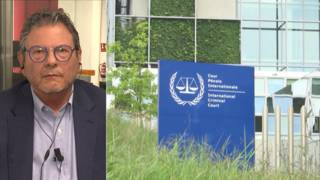
Related
Guests
- Kumi Naidooglobal ambassador for Africans Rising for Justice, Peace and Dignity, and a lifelong South African human rights and climate justice activist. He is the former secretary general of Amnesty International and also former head of Greenpeace.
On day three of the U.N. climate summit in Glasgow, Scotland, we look at the fight against Big Coal, starting with leading South African climate activist Kumi Naidoo. South Africa is one of the world’s largest coal producers, and the United States has joined the European Union and other wealthy nations to announce a new deal to provide $8.5 billion to the country to help it decommission its coal plants and invest in renewable energy. “Let’s see if the money actually flows and if those countries actually follow up with that commitment,” says Naidoo, global ambassador for Africans Rising for Justice, Peace and Dignity and the former head of Amnesty International and Greenpeace. He says the deal puts pressure on the South African government to “ensure a just transition and make the right investments in wind, solar and other clean energy technologies.”
More from this Interview
- Part 1: Kumi Naidoo at COP26: Will Rich Countries Deliver Pledged Billions for South Africa to Get Off Coal?
- Part 2: Hurricane LUMA: Puerto Ricans Fight Big Coal & Privatized Energy Amid Climate Disasters, Blackouts
- Part 3: Uproot the System: Filipina Activist Mitzi Tan on How Capitalism & Colonialism Fuel Climate Crisis
Transcript
AMY GOODMAN: This is Democracy Now!'s Climate Countdown. I'm Amy Goodman, with Juan González, as we go to the U.N. climate summit in Glasgow, where 90 countries have agreed to slash methane emissions by 30% by 2030 — methane, one of the most potent greenhouse gases; the effort led by the United States and Europe. Climate groups praised the initiative but said far more needs to be done to rapidly slash overall carbon emissions in order to avoid a climate catastrophe.
In other news from Glasgow, the United States, European Union and other wealthy nations have announced a new deal to provide $8.5 billion to South Africa to help it decommission its coal plants and invest in renewable energy. South Africa is one of the largest coal producers in the world.
So we’re going to begin there with one of the leading South African climate activists, Kumi Naidoo, former secretary general of Amnesty International and was previously the head of Greenpeace, now a global ambassador for Africans Rising for Justice, Peace and Dignity.
Kumi, welcome back to Democracy Now! It’s great to have you with us. As you stand there in Glasgow, talk about this deal that was just made between the U.S., EU and South Africa, and the significance of coal there, and whether you see this as the beginning of a radical change in the world.
KUMI NAIDOO: This is a positive move in the right direction. The detail needs to be looked at more clearly. It’s put pressure on the South African government, which had been dragging its feet, to actually have a more aggressive timeline to actually get off coal. The challenge is that about 100,000 people rely on coal mining jobs for their survival. But it’s clear, with these resources now, the South African government does not have an excuse to ensure that there is a just transition for workers in that, various coal mining industries, to be able to transition to clean energy jobs.
Of course, part of the package is to make sure that South Africa can increase its renewable energy output as soon as possible. Just note, though, that there’s an additional challenge, because South Africa relies for its electricity needs 80% on coal, and with that 80% right now for the last decade, there’s been electricity cuts and so on.
So there’s a real possibility here for the South African government to move with urgency to transition in an aggressive way from coal to clean energy, and the options for South Africa, if it gets serious, are significantly positive. But the truth is, the government has dragged its foot for far too long, and we are playing catch-up in South Africa, as we are playing catch-up everywhere in the world.
And I think it’s worth noting that the decade that we find ourselves in is the most consequential decade in humanity’s history. What we achieve in the next 10 years will determine what kind of future we will have, or whether we will have a future at all. So the stakes are very high.
The only cautionary point I would say, in conclusion, is that — be careful about these grand announcements that are being spliced in every other day. We need to make sure that we do the math at the end of it, because we could have these grand announcements, and they won’t add up. And secondly, let’s just be clear, rich countries’ governments make announcements of financial support, as it did for the 100 million pounds a year — sorry, dollars a year for the Green Climate Fund by 2020, which they’ve not delivered. So, let’s see whether that money actually flows. And we need to be vigilant to make sure that those nations actually follow through with that commitment.
JUAN GONZÁLEZ: And, Kumi, you mentioned that the South African government has been slow to make — to really address any transition away from coal. Why is that? I mean, is it because the mine workers or the coal miners are such a critical constituency of the ANC, or is it just that the leaders have been in denial about the continuing advance of the climate crisis?
KUMI NAIDOO: Well, I would say the first reason is the corruption chain — right? — in terms of big fossil fuel projects is more juicier, more bulkier, more lucrative. And it’s not to say that renewable energy projects are immune from corruption, but actually they tend to be on a much lower scale, and it’s easier to monitor. And unfortunately, as is known by the South African people and globally right now, we have a very corrupt leadership that’s in — that’s been there, and the current leadership is trying to make things better, but the question of how decisions are made about what economic choices to make and about what spoils would be is a reality. The second — and therefore, it’s very important that in the implementation of the deal, that there is consultation with faith leaders, with civil society, and so on, to make sure that those resources go to where they need to go.
But it is true that the trade union movement, who are very open to a just transition — we, in the environmental movement, love the workers that work in our country. Right? We do not think they should be punished. It was not their fault that they were told that you need to deliver energy through a dirty means, right? And therefore, we are saying, with younger workers, younger workers can easily be retrained and find jobs in the emerging renewable energy sector. For older workers who are close to retirement, there needs to be proper compensation for them that they retire with dignity.
And so, I also think the other factor is that there’s a denial, just as there’s a denial in virtually every country around the world, where our political leaders say one thing, recognize the problem is serious, but revert to business as usual. But this commitment — this announcement does put pressure on the South African government to act with greater urgency, and it opens up possibilities also for civil society and environmental activism in South Africa to say, “You don’t have an excuse anymore to drag your feet.” Of course, the unions are going to, correctly, want to see the finer print in what this deal is about. But I think, given the scale of the money, we should be able to ensure a just transition and make the right investments in wind, solar and other clean energy technologies.
JUAN GONZÁLEZ: Yet despite the climate crisis, there’s more coal mines being opened up around the world these days than ever. Could you — given that coal is the most polluting fossil fuel and many countries are heavily relying on it for electricity, how do you think a deal like this may have an impact in other countries, let’s say, like India or Indonesia or other nations around the world?
KUMI NAIDOO: We hope that this announcement will have a knock-on effect, particularly with the two countries you mentioned, to start with, Indonesia, India, Australia and several others. We have to recognize that an investment of even $1 in any new coal project, based on what we know and how close we are to the climate cliff, must be understood as an investment in the death of our children and their children. So, any investment in especially coal, but all fossil fuels right now, given what the science is saying, how little time we have — we are one minute before midnight — and so on, must be understood as irresponsible, reckless, and is really a confirmation that the fossil fuel industry, those oil, coal and gas companies, still exercise far too much of power on and control over many so-called elected governments in many parts of the world.
AMY GOODMAN: Kumi Naidoo, we want to thank you for being with us, but we want to have you back on before you leave, global ambassador for Africans Rising for Justice, Peace and Dignity, former secretary general of Amnesty International, previously head of Greenpeace, in Glasgow right now inside the COP, the Conference of Parties of the U.N. climate summit.










Media Options